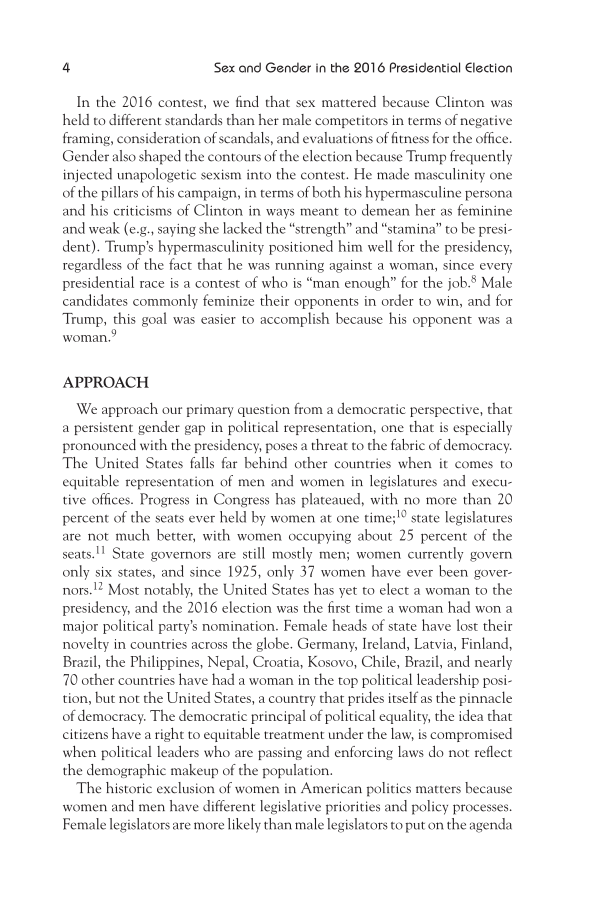4 Sex and Gender in the 2016 Presidential Election In the 2016 contest, we find that sex mattered because Clinton was held to different standards than her male competitors in terms of negative framing, consideration of scandals, and evaluations of fitness for the office. Gender also shaped the contours of the election because Trump frequently injected unapologetic sexism into the contest. He made masculinity one of the pillars of his campaign, in terms of both his hypermasculine persona and his criticisms of Clinton in ways meant to demean her as feminine and weak (e.g., saying she lacked the “strength” and “stamina” to be presi- dent). Trump’s hypermasculinity positioned him well for the presidency, regardless of the fact that he was running against a woman, since every presidential race is a contest of who is “man enough” for the job.8 Male candidates commonly feminize their opponents in order to win, and for Trump, this goal was easier to accomplish because his opponent was a woman.9 APPROACH We approach our primary question from a democratic perspective, that a persistent gender gap in political representation, one that is especially pronounced with the presidency, poses a threat to the fabric of democracy. The United States falls far behind other countries when it comes to equitable representation of men and women in legislatures and execu- tive offices. Progress in Congress has plateaued, with no more than 20 percent of the seats ever held by women at one time 10 state legislatures are not much better, with women occupying about 25 percent of the seats.11 State governors are still mostly men women currently govern only six states, and since 1925, only 37 women have ever been gover- nors.12 Most notably, the United States has yet to elect a woman to the presidency, and the 2016 election was the first time a woman had won a major political party’s nomination. Female heads of state have lost their novelty in countries across the globe. Germany, Ireland, Latvia, Finland, Brazil, the Philippines, Nepal, Croatia, Kosovo, Chile, Brazil, and nearly 70 other countries have had a woman in the top political leadership posi- tion, but not the United States, a country that prides itself as the pinnacle of democracy. The democratic principal of political equality, the idea that citizens have a right to equitable treatment under the law, is compromised when political leaders who are passing and enforcing laws do not reflect the demographic makeup of the population. The historic exclusion of women in American politics matters because women and men have different legislative priorities and policy processes. Female legislators are more likely than male legislators to put on the agenda
Document Details My Account Print multiple pages
Print
You have printed 0 times in the last 24 hours.
Your print count will reset on at .
You may print 0 more time(s) before then.
You may print a maximum of 0 pages at a time.

































































































































































































































